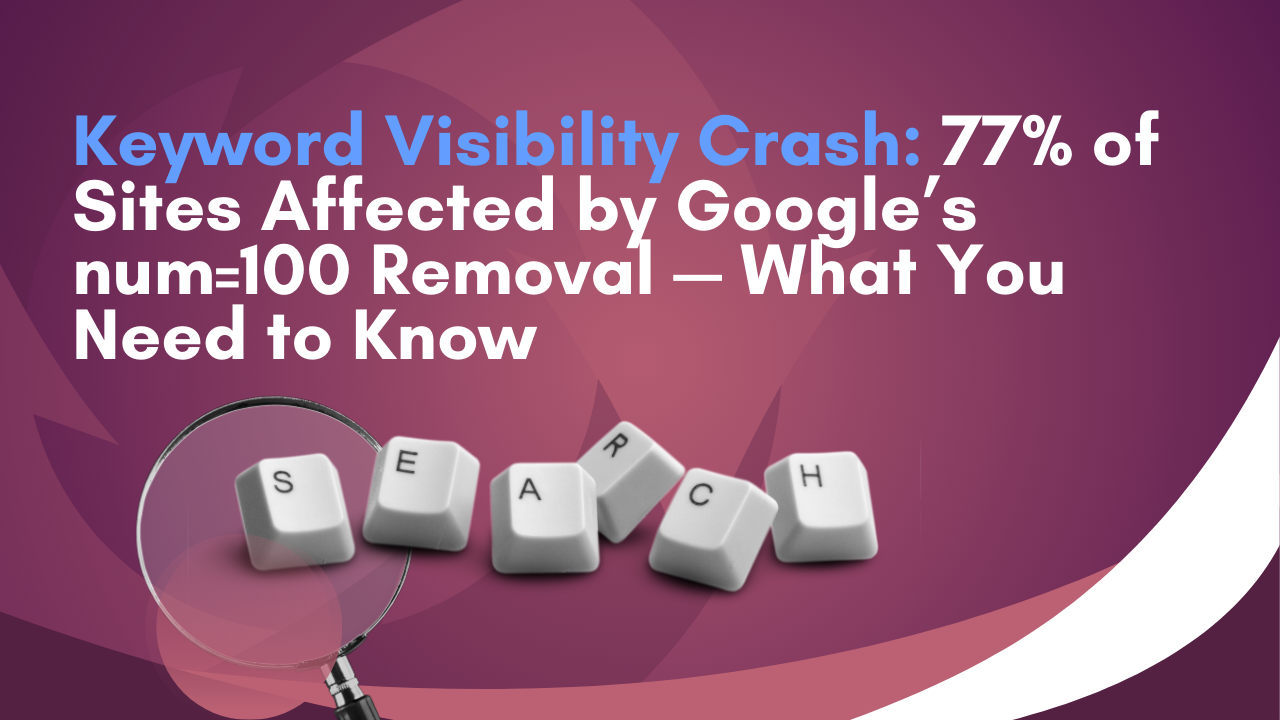Keyword Visibility Crash: 77% of Sites Affected by Google’s num=100 Removal — What You Need to Know

If your impressions dropped, your average position "improved," or your keyword visibility constricted—breathe a sigh of relief. It's not always a rank drop; it probably is a data shift. Let's explore what occurred, how it affects your site, and how to re-calibrate your SEO strategy with the Prayug Advantage.
What Exactly Was &num=100 — And Why It Mattered
The num=100 parameter extracted search results' maximum of 100 per page rather than the typical 10 or 20. Third-party tools and SEO researchers utilized it to make educated guesses of inner keyword positions.
Many tools, spiders, or scrapers relied on num=100 to extract more pages/results, which was piling up impression and keyword visibility statistics—usually artificially.
The Fallout: Data Looks Worse—but Reality Might Be Different
This is what the majority of site owners are witnessing:
-Metric What Occurred
-Impressions
-Almost 88% of websites experienced declines in Google Search Console impressions.
-Unique Keywords / Query Count
-Almost 77.6% of websites lost some of their individual rank terms.
-Average Position
Looks better—since figures on pages two and further aren't included in most instances. So your average rises even if nothing else moved on page 1.
Why This Hurts (and Helps)
Short-tail and mid-tail keywords are getting slammed the most. If your site is dependent on them, look for decreases.
Second-tier pages (pages 2-10) gained earlier with inflated data. Now, gains are wiped out, leaving cleaner but not as nice data.
The new baseline makes users, SEOs, and webmasters face reality. No more "forgotten traffic" from deep placements anymore. While it's seen as a loss, it's integrity of data restored.
What To Do Now — The Prayug Advantage Strategy
Re-set Your Benchmarks:
Do not compare pre-num=100 data face-to-face with post-num=100. Establish new baselines for impressions, keyword frequency, and average position.
Prioritize High-Intent, Top-Page Keywords:
Already page 1 (or close enough) keywords will fare better than ever before now. Long-tail search with value to convert must be of high priority.
Track Clicks, Engagement & Conversion—not Impressions:
Impressions declines are not business declines. Monitor what actually does: how many click through, how long they stay, and if they convert.
Audit Your Toolset:
Some SEO tools may still be relying on methods that expected &num=100. Check their settings, dashboards, and report structures. Make sure you’re using tools that reflect the new reality.
Double Down on Content Quality & Authority:
Google is gradually moving away from vanity metrics. Where visibility metrics falter, winners will be those that provide depth, worth, open expertise, and meaning in content.
Why Prayug Is Here to Lead You Through This Evolution
We envision this evolution as an opportunity, not an interlude, at Prayug. This is the way we're leading our students and clients through:
We're not showing you traffic tricks of driving—skills such as content strategy, SEO fundamentals, keyword intent, user activation, and authority creation.
Our approach is in real-world projects and mentor feedback, so you get to find out what really works in real-life scenarios and not test metrics data.
Our whole curriculum is gone over regularly so that we remain up to date with the most recent SEO trends—so whenever Google updates, you update too.
Final Thoughts
The collapse of &num=100 is a SEO behemoth breakpoint of recalculation. True, a group of sites dropped out of keyword view. True, some benchmark figures are worse. But overall, we're dealing with cleaner, better data today. If you strategically shift—to content, tools, and metrics—you can come back stronger.
At Prayug, we’ve always believed in learning for results. Because in the end, the numbers that matter are real clicks, real engagement, and real growth.
Stay sharp. Stay updated. And gear up for the next wave.
Top Blog Posts





